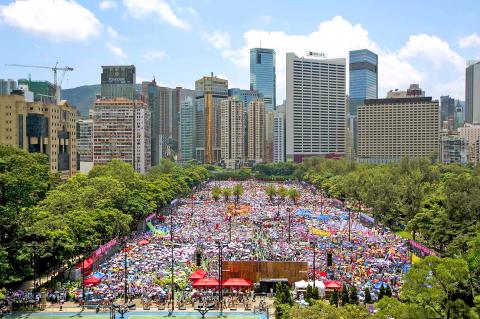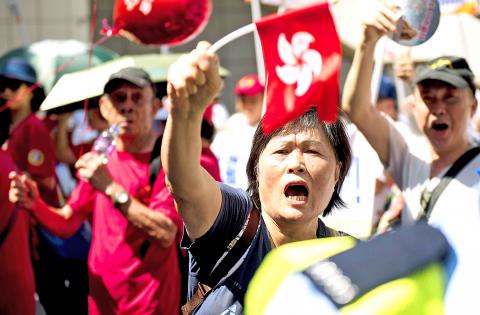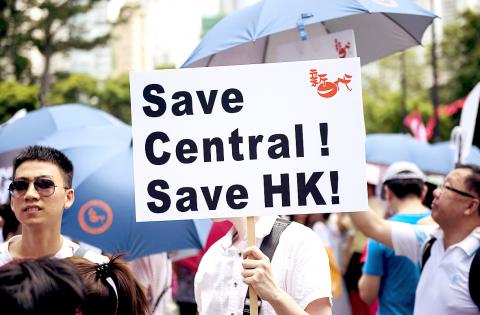Tens of thousands gathered yesterday in sweltering heat in Hong Kong to protest against a pro-democracy campaign that has threatened to shut down the territory’s financial district, exposing a deepening rift over political reforms in the former British colony.
The rise in tit-for-tat street protests between pro-Beijing and pro-democracy groups accents the challenges China faces in shaping Hong Kong’s political future.
Backed largely by Beijing-friendly groups, Hong Kong’s Alliance for Peace and Democracy says it “desires peace and no violence” and has denounced the pro-democracy Occupy Central movement that has said it would lock down the city center if Beijing does not allow truly democratic elections for a chief executive in 2017.

Photo: Reuters
“We want to show that the march does not have to be violent and angry. It can be happy,” former Hong Kong radio host and spokesman for the alliance Robert Chow said.
The group says it has so far collected close to 1.5 million signatures, including that of Hong Kong Chief Executive Leung Chun-ying (梁振英), saying the “illegal” Occupy campaign would tarnish Hong Kong’s reputation and hurt business.
It was not possible to independently verify the claim, which exceeded the almost 800,000 votes in Occupy Central’s unofficial poll on democracy in June.

Photo: AFP
The campaign kicked off early yesterday with a run through the center of Hong Kong that drew about 1,500 people in temperatures as high as 30°C, organizers said.
The rally was overshadowed by speculation that some business groups had pressured people to take part.
One Chinese participant surnamed Chen, who is in her 60s, said some people attended simply because they like running.

Photo: AFP
“I bumped into a friend. She is running with colleagues from a property-management firm. She said her firm encouraged her to run and she took part because she likes running,” she said.
More people, mostly groups of elderly people, showed up later in the morning to offer a flower “for peace,” with different groups wearing the same colored T-shirts and hats.
Occupy Central has said its movement is peaceful, demanding a “genuine choice” for Hong Kong’s 5 million eligible voters.
“We do not support Occupy Central because it will bring trouble and instability to the city,” retiree Law Kwai-wing, 77, said, adding that he had traveled across the border from China’s Guangdong Province as part of a bus tour organized by the pro-Beijing Federation of Trade Unions (FTU).
The group planned to stay for less than an hour before returning across the border for lunch, which tour members would buy for themselves, he added.
Many participants said that they had been provided with free transportation by political and business groups. In one district, about 150 people boarded buses organized by the Hong Kong Livestock Industry Association.
In a WhatsApp message seen by reporters, people were offered HK$350 (US$45) to attend the rally “for five hours.” However, the message sender declined to provide their name or background.
Alliance spokesman Chow dismissed such messages as fake and attempts to discredit the campaign.

CHAOS: Iranians took to the streets playing celebratory music after reports of Khamenei’s death on Saturday, while mourners also gathered in Tehran yesterday Iranian Supreme Leader Ayatollah Ali Khamenei was killed in a major attack on Iran launched by Israel and the US, throwing the future of the Islamic republic into doubt and raising the risk of regional instability. Iranian state television and the state-run IRNA news agency announced the 86-year-old’s death early yesterday. US President Donald Trump said it gave Iranians their “greatest chance” to “take back” their country. The announcements came after a joint US and Israeli aerial bombardment that targeted Iranian military and governmental sites. Trump said the “heavy and pinpoint bombing” would continue through the week or as long

TRUST: The KMT said it respected the US’ timing and considerations, and hoped it would continue to honor its commitments to helping Taiwan bolster its defenses and deterrence US President Donald Trump is delaying a multibillion-dollar arms sale to Taiwan to ensure his visit to Beijing is successful, a New York Times report said. The weapons sales package has stalled in the US Department of State, the report said, citing US officials it did not identify. The White House has told agencies not to push forward ahead of Trump’s meeting with Chinese President Xi Jinping (習近平), it said. The two last month held a phone call to discuss trade and geopolitical flashpoints ahead of the summit. Xi raised the Taiwan issue and urged the US to handle arms sales to

State-run CPC Corp, Taiwan (CPC, 台灣中油) yesterday said that it had confirmed on Saturday night with its liquefied natural gas (LNG) and crude oil suppliers that shipments are proceeding as scheduled and that domestic supplies remain unaffected. The CPC yesterday announced the gasoline and diesel prices will rise by NT$0.2 and NT$0.4 per liter, respectively, starting Monday, citing Middle East tensions and blizzards in the eastern United States. CPC also iterated it has been reducing the proportion of crude oil imports from the Middle East and diversifying its supply sources in the past few years in response to geopolitical risks, expanding

Pro-democracy media tycoon Jimmy Lai’s (黎智英) fraud conviction and prison sentence were yesterday overturned by a Hong Kong court, in a surprise legal decision that comes soon after Lai was jailed for 20 years on a separate national security charge. Judges Jeremy Poon (潘兆初), Anthea Pang (彭寶琴) and Derek Pang (彭偉昌) said in the judgement that they allowed the appeal from Lai, and another defendant in the case, to proceed, as a lower court judge had “erred.” “The Court of Appeal gave them leave to appeal against their conviction, allowed their appeals, quashed the convictions and set aside the sentences,” the judges